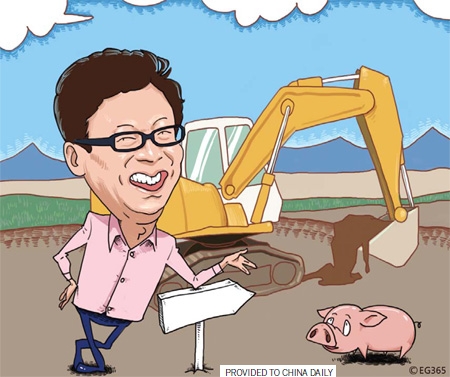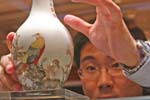Bring home the bacon
Updated: 2011-04-15 13:23
By Xu Junqian (China Daily European Weekly)

Internet entrepreneur charts new course with organic pig farming
If billionaire Internet entrepreneur Ding Lei has his way, he intends to revolutionize the way that China farms pork.
But running a piggery is the last thing that one would expect the top honcho of NetEase to dabble in, especially at a time when concerns over food safety are increasing in China.
Ding is better known as the founder and chief executive officer of NetEase, an Internet portal that competes fiercely for market share with Sina.com, Sohu.com and Tencent in the virtual world. He has also been a Forbes billionaire for several years now.
But Ding always differed from the rest of his peers in that he has the vision and the will to pursue his dreams.
Luosifang, a village in East China's Zhejiang province is where he is setting up his 300-million-yuan (31.8 million euros) organic pig farm.
Though news of the organic pig-farming venture coincided with the tainted-pork scandal, Ding says it was something he had dreamt of in 2008.
During a dinner at a hotpot restaurant in 2008, Ding realized that something was not right about the color of the pig blood curds, a local delicacy. It triggered suspicion in his mind that the pigs were not being raised properly and the farmers were using drugs and chemicals.
Alarmed at the prospect of the tainted chemicals/drugs finding their way into the human body, Ding zeroed in on the idea of setting up an organic pig farm.
But setting up a niche pig farm was not an easy task as China was already home to half the world's pigs. For starters, Ding decided to set up an agriculture division for safe foods under the NetEase umbrella.
"Our philosophy is simple, we want the animals to grow healthily. We are doing this for the good of our children," says Mao Shan, general manager of agriculture at NetEase.
Ding's action has spurred several other entrepreneurs and businessmen to set up farms or eateries that specialize in safe, or organic foods.
Dai Jianjun, an entrepreneur from Zhejiang, is already making waves with his rustic eatery, Longjing Manor, that serves family dishes prepared with "guaranteed" natural ingredients.
The exclusive restaurant near the West Lake in Hangzhou has only eight tables and can accommodate not more than 80 guests at a time. An ordinary dish of scrambled eggs with chives would cost as much as 200 yuan, but the demand is such that one has to make reservations several weeks in advance to, as Dai puts it, "savor the taste of nature".
NetEase's intrusion, however, has created hardly any ripples in Luosifang, a rustic hamlet of 1,243 people. Here one can still get occasional glimpses of hares and boars darting between rows and rows of tea planted on the hillsides, dotted by a few log cabins.
There are no telltale signs of the pig farm anywhere and the closest that one can get a whiff of things is the newly paved road leading to a clearing deep in the bamboo forests.
Mao says it is an ideal location for raising pigs. Apart from fresh air, clean water and moderate climate, Lousifang also enjoys the advantage of being in relatively close proximity to markets in big cities like Shanghai and Hangzhou.
"Pigs in China are mostly raised in factory-like conditions and often confined in tight spaces and fed commercial feeds that are chemically enriched," Mao says.
"In contrast, the pigs in Europe lead relaxed and healthy lives in well-kept farms surrounded by orchards and roam about freely," he says. This, he emphasizes, is going to be the way we will raise pigs in Lousifang.
NetEase expects to complete the pig farm in three years and will have a vertical operation right from breeding to slaughtering and packaging the pork. The farm can hold 6,000 to 10,000 pigs at any given point in time, says Mao.
To guarantee the quality of the pork, the pigs will be fed with natural ingredients that are prepared in-house by NetEase. All the animal waste, Mao says, will be recycled as organic fertilizer for local tea plantations.
Mao says that the building area will occupy only about 5 percent of the total site. "We want to have huge open areas to reduce the chances of any epidemic. Our primary concern is pork safety," he says.
NetEase says that the local government has also been supportive of its farming venture and helped it acquire the farmland and settle compensation claims. According to Mao, the farm is expected to provide hundreds of jobs to the local farmers.
Despite the huge investment, Mao says that NetEase is not unduly concerned about the returns from the venture, as its core business is doing reasonably well.
To show its goodwill, NetEase says that it is willing to freely share its proprietary pig farming research with those who are interested in setting up similar ventures.
"The system we advocate is not giving healthy pork for free or at a very low price, which is unsustainable. You have to let the businessmen and farmers see the profit in this new pig-raising project, so they will join in and expand the market," says Mao.
Some of Ding's peers either from IT or other industries have been inspired to invest in the agriculture sector.
E-paper

Green light
F1 sponsors expect lucrative returns from Shanghai pit stop
Preview of the coming issue
Toy for rich boys
Reaching out
Specials

Share your China stories!
Foreign readers are invited to share your China stories.

No more Mr. Bad Guy
Italian actor plans to smash ‘foreign devil’ myth and become the first white kungfu star made in China.

Art auctions
China accounted for 33% of global fine art sales.
